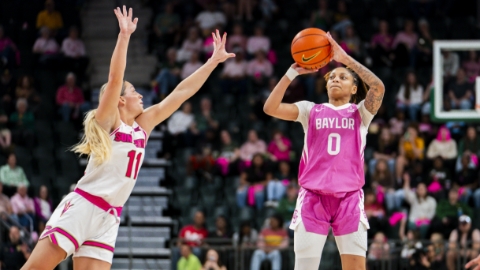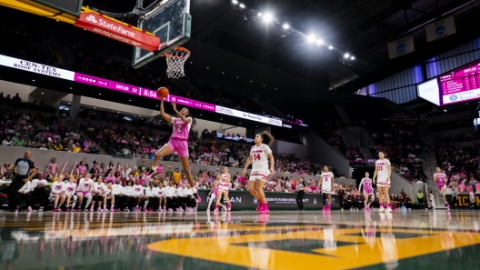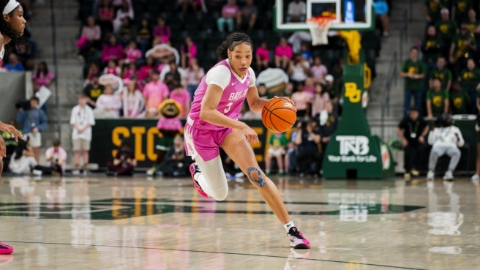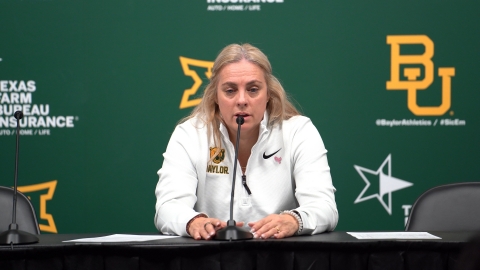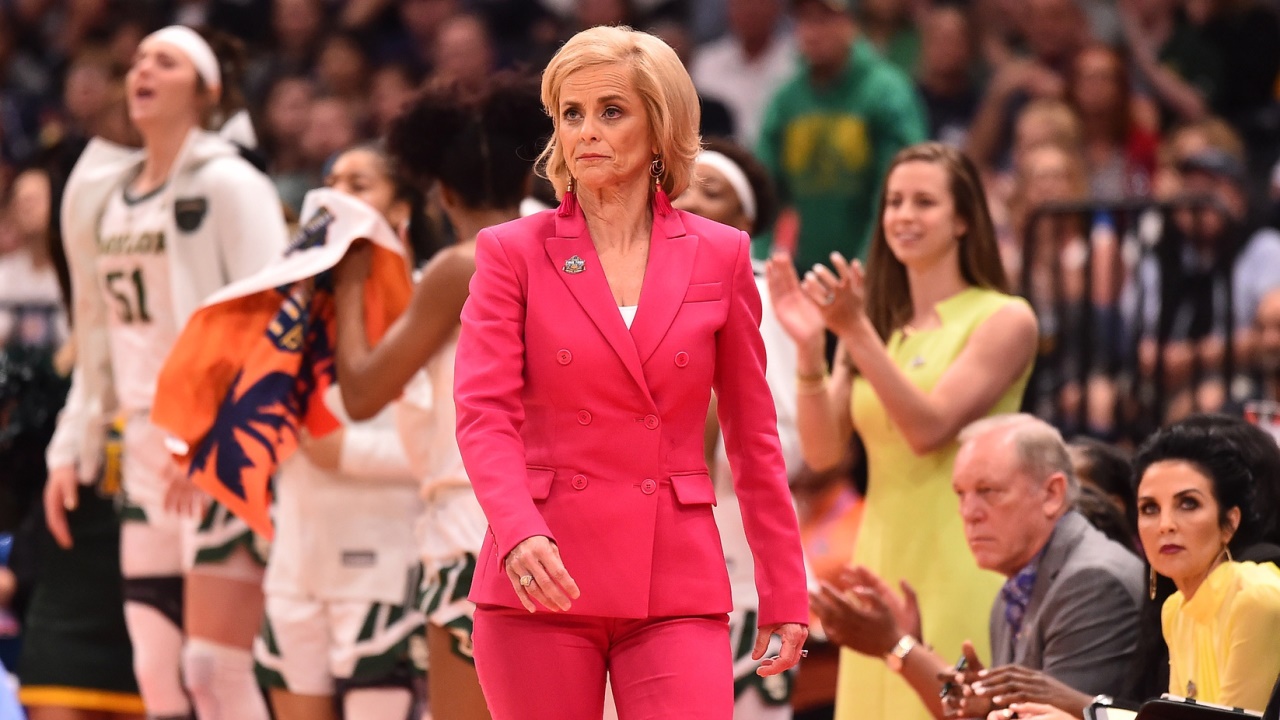
Q. You were here in this position seven years ago, obviously winning a title then. How have you changed in the last seven years as a coach from then till now, if you have?
KIM MULKEY: Some things will never change. I think holding kids accountable will never change. Your disciplining of kids so that you have control of your locker room. I think you change and you evolve as a coach based on the student-athletes that you have, what motivates them, how to reach them.
I have a locker room full of unbelievable competitors, but it's a totally different personality than the 2012 team. It's my job to figure it out and adjust to them when it comes to motivation and how to get the most out of them, decide what their roles are.
Q. How hard is it to prepare for a team like Notre Dame after just the one day?
KIM MULKEY: Well, you kind of plan ahead. I tell you guys back home all the time it wasn't raining when Noah built his ark. As the bracket comes out, you kind of assign coaches to different teams, but you focus on the next opponent.
We had already done our work on Oregon and our work on potentially who you could see, UConn, people down the road.
When you get to that time to present it, you've already done the work as a staff. All that's left to do is sit and watch who you play. You don't present anything until you know for certain who you're going to play.
We're running a little bit late this morning because we're 20-something minutes away, we get in traffic. But we also have to present Notre Dame to our team this morning.
So I hope that's answered your question. You're trying to do all the requirements that you have to do, but you also have to get their attention and stay on track to what your normalcy is.
They watched the game. I'm sure they've watched some Notre Dame games through the season. They know how good they are. They know they're the defending champs. They know basically they play five kids that won't be back next year other than potentially Jackie Young. They have experience in the game.
Does that help a little bit?
Q. Yes.
KIM MULKEY: All right (smiling).
Q. Can you talk about the evolution of Kalani a little bit from the player you got when she first got here, the player she is today.
KIM MULKEY: Well, there is no change in Kalani Brown's personality and who she is as a person. Just the kindest, sweetest kid, happy kid. Basketball-wise, I thought when we got her she played like that. I thought that she just really kind of wanted to blend in instead of really using her size to be dominant. If it was just asking for the ball, it's okay to raise your voice and holler, Give me the ball. Sometimes that doesn't come natural for kids.
Kalani, as you saw last night, went to the offensive boards. She had a presence in that paint. There's nothing that's gotten phenomenally better other than the maturation process. She's always been able to shoot the perimeter shot. We just don't have to use it in our style of play with her and Cox.
She's got a beautiful shot. Maybe her mobility, as people want to call it, her ability to guard people off the dribble, she works on that from the high post. Has not had to go to the three much to do that since her freshman year.
She plays for longer periods of time where she doesn't need rest. But her fundamentals of the game were there. I attribute that to her mother. Her mother was an assistant coach on her high school team. Her mother coached her during the summers.
Kalani is just Kalani. She's just a happy-go-lucky kid and very pleasant.
Q. With DiDi Richards defensively, but offensively, especially as of late, she's been pretty special. Her development in that area, could you speak on that a little bit.
KIM MULKEY: Well, I think DiDi has figured out that she's not going to be a liability on the offensive end when people don't guard her, so she cuts to the basket, she finds open areas to do good things. If it's an offensive board, cutting to the basket when our post players, who are tremendous passers, can find her.
She's very confident. She took a critical shot there late in the game, and she didn't hesitate to do that. Now, that comes from her being confident. That may not be, if I was drawing up a play, the option for her to be the first one to shoot that. But, hey, she's gotten us to this point. It wasn't a bad shot. It was a very makable shot for her.
Q. After the game ended, the team was celebrating, you're crouched down courtside and stayed there for a long time. What were you thinking?
KIM MULKEY: Hell, I'm too old to get up (laughter). No.
I just looked at 'em and thought, This is why you coach. I think I've done that before, just taking the moment. Those kids had never been to a Final Four. They were going to now play for a national championship. I just wanted to just watch 'em.
I think one of my assistants came behind and said, Coach, get up.
I just wanted to take it all in. I just happened to be squatted at the end of game because that's the position I was in. Just taking in the moment.
Q. You mentioned how different this team is from your Final Four team. Was there something from that Final Four run that informed this one, either something you wanted to make sure you did this time or you didn't do, anything that kind of affected how you're managing the team this time around?
KIM MULKEY: No, not at all. You don't compare teams. Just do what we've been doing for however many games we've been doing it this year, don't change who we are. I don't have a team in that locker room that gets too high or too low. They certainly don't stress over anything. They have fun.
The fun part for me is just allowing them to be who they are. Think I only lose two of them. I have a whole boatload of them back that are very talented. Those kids are experiencing something that they won't ever forget. Hopefully the younger ones will take it with them when we start next year.
Q. Geno said last night that Notre Dame could get a basket any time they wanted to, compared them on the offensive end to some of his best teams. What do you see that would make him say those things?
KIM MULKEY: Well, they're defending national champions. They all average pretty much in double figures, except for probably in the playoffs, I think they have four or five averaging in double figures. They have bigs inside. They shoot the three ball, not like an Oregon, but they will shoot the three ball. They're athletic. I guess just the fact that they can score at all positions.
Maybe Geno's trying to say he doesn't have that at all positions. I don't know. I can't respond to why he said that.
I know he went to Notre Dame and beat them this year, so his team is pretty darn good. He needs to give them a little credit.
Q. Muffet has talked a lot about the need for even more female role models, how important that is. You probably saw a lot of her remarks. Could you address that. With the two of you going for a national championship, I feel like you two are the spokeswomen for women's basketball. What do you think about being in that role?
KIM MULKEY: Muffet's coached a lot longer than I have. She's a Naismith Hall of Famer. What I think really doesn't matter.
I will tell you this. I understand her points, without a doubt. But I'm of the belief, I want the best person for the job. I have a son, and I would be honored if my son wanted to coach next to me.
She has a son. I think she would be honored if he wanted to coach women's basketball. So I tend to stay away from saying the word 'never.' Bringing attention to what needs to be fixed, but don't give an absolute answer because I don't want to hire somebody just to be hiring them. I want to hire somebody that can help us be successful.
As a female and a mother of a son and a daughter, I'm very careful, you know, saying 'never.' But I do understand what she is saying. Statistics are glaring. She has a right and an opinion to say whatever she wants to say.
I'm just very careful about that mainly because I have a son.
Q. When you say 'let the players be who they are,' has that always been the case? Is that something you've evolved where you let them be more who they are? It seems like when I think of some of the players back in the past that you had to deal with, knuckleheads...
KIM MULKEY: Well, it's not that those in the past weren't who they are. It's just they were a little bit more reserved. They didn't have the DiDi silly, goofiness at a press conference. They were just more reserved.
You got to let players be who they are when it comes to team chemistry and how they motivate each other and pull for each other. That's all I meant by that.
Q. You've had quite a bit of success signing post players with considerable height. In recruiting, how much is that a factor, height, looking for post players? Is that the factor?
KIM MULKEY: We try to find the best players. We've just been blessed that in our recruiting that we have had some of the greats of the game. I just think you have to, as a coach, run a system that showcases their talents. If I don't have post players, I can't run some of the stuff that I do.
But I've been very fortunate that when a group graduates, we have younger ones that are big coming into the program.
Do we go in and say, Gosh, get me the biggest? That would be great. But, you know, recruiting is difficult. We try to get the best that we can at all positions, then whatever we -- whoever we sign, then we evaluate what we need to run and what we need to do.
Q. Lauren and Kalani a couple weeks ago spoke about how fresh they feel, basically sitting out the fourth quarter the majority of the season. Both of them played high minutes, Lauren playing all 40. Did you see those fresh legs last night?
KIM MULKEY: Yes. When you have depth, you can play a lot of players. Not only are you resting them for the playoffs, you're also letting the young ones gain experience. I just thought we had a team, and I was allowed to do that a lot this year.
It's funny because in one of the playoff games, I want to say it might have been Iowa, somebody questioned, You played them 35? Was it the semifinal, I can't remember. Would they be ready for the next game.
I'm like, This is why we rested them all year for six games so they would be able to play those amount of minutes.
Those kids, they'll do whatever you ask. If they need to play 40, they'll play 40. If they need to play 20, they'll play 20. It's playoff time. I didn't think of the players that played were fatigued at all.
Q. You touched on this briefly last night. You mentioned the gap in three-point shooting in the game last night. You mentioned that you like to tailor your offense to your personnel. When it comes to having more of a postgame, are you comfortable with that perhaps against a game more predicated by deep shooting?
KIM MULKEY: Again, I'm going to do with what I need to do based upon what my kids are capable of doing. You have to remember, we lost two perimeter three-point shooters when the season started. Starting point guard and starting two player. One transferred, one was dismissed. Those kids could stroke it out there.
I still say that the offense that we run with our two bigs, our leading scorer should be a three-point shooter, or a perimeter shooter, because of the amount of attention that they receive. I've always thought that.
Am I more comfortable with that? I'm comfortable with whatever I need to do. You never become stagnant as a coach that you go out and say, Okay, this is the style I run, these are the kinds of players I need to recruit. That would not be very smart on my part.
Go recruit the best players at every position, and if they're big, great. Get them there, then see what you need to run, and run it.
Does that help a little bit?
Q. How nice has it been for you to celebrate this run with your family, your daughter being on your staff, your grandson being around all the time, stealing press conferences? After 2012 you had a chance to repeat in 2013. Talk about how difficult it is to win back-to-back titles. Notre Dame is one victory away from accomplishing that feat.
KIM MULKEY: Let me put it in perspective. How many national championships has Muffet won? How many have I won? How long has she been coaching? How many years? I don't know. Probably a heck of a lot longer than me.
Does that tell you how hard it is? It's hard. It is so hard to win championships. You can be the favorite and not win 'em. I've been the favorite and not won 'em. I've been the underdog and won 'em. There are no guarantees in this business. That's why you cherish the moment.
To answer your question about my family, I don't think it's any secret that we had just a horrible year with the death of a grandchild, yet I don't think as a family, I'm talking about Makenzie and myself, we had time to grieve. You're right in the middle of the season. We're opening up at UCLA. So our grief was put into our work.
She gets pregnant and has Kannon. You bet I'm going to hang onto him. Holding a child up here is a heck of a lot more touching than holding one right here that's deceased. I've done both in the last year and a half.
Every chance I get, you bet, because in my world, anybody will tell you, it is about family first. When I was hired, I told the president at Baylor, If a decision has to be made about my job and my family, that decision was made a long time ago. I live by that.
I think my players know it. They see it. They feel it. They come first. It should be in all of our lives. It doesn't just take the death of a child to get your attention. But sometimes it really does. So you're going to see him. The only thing I hate is Kramer is not here. St. Louis Cardinal fan. Another single last night. Great story. Can I talk about him a little bit?
So I get to the room, Why won't you answer my calls? He's playing during our game. He's in the on-deck circle. He has the trainer. Get on the app. It was a tie ballgame, whatever, late in the game. Still don't have a score, they go to timeout. Mom, I go to the field, the whole team now is like they know the signal. I'm at shortstop. I'm looking in the dugout. Just give me a thumbs up or a thumbs down.
He said, I'm freaking out out there. I can't focus. He said, I have a line drive hit at me, I field it, get it. I see a thumbs up. All the guys on the team are just, like, going nuts. You would have thought we won the national championship, he said, because we were all trying to do our job, but we have an interest there.
I said, Well, Kramer, it was that kind of game. Nobody can give you a thumbs up or thumbs down. So he was excited.
I miss him being here. But you guys know family comes first with me. That's all we have really at our lowest moments is our family.
I want to say this. How many AP writers in here? Guys, I failed at the AP awards thing to acknowledge you guys. That's a humbling thing to win that award. Should have been the first people I thanked. So I'm thanking you publicly. I'll put it out on Twitter. Y'all know that I only win those awards because of the kids.
I'm glad you brought that to my attention. You've been around the game, Michelle, Hawkins. You all been doing this a long time. Y'all have been doing it longer than I've been coaching. Y'all are much appreciated.
Q. You talked a little bit about enjoying the moment, the quick turnaround. With the quick turnaround, how do you walk the line of you and your team smelling the roses but also know there's work to do?
KIM MULKEY: We can't go out here and run up and down the floor. I don't think anybody can. You walk through. You watch film. You know what you're going to do. You just tell them, This is what we're going to do defensively, okay? They know what we're going to do offensively. You got to get the soreness out. You got to get baths. You got to get all the things you can to let their bodies recover.
We have requirements with media and ESPN, NCAA. We have an autograph session. We're going to do those gladly, but with a little fatigue. But make sure that you get rest, you get rest too. It's a fine line, but we'll figure it out. Notre Dame, we're both in the same boat.
Q. During this run, how much is the team thinking about Chameka Scott?
KIM MULKEY: We haven't talked about it a whole lot. We haven't talked about losing Scout, my granddaughter. Those really are not things we talk about right now. I think everyone is so excited, but yet they have a businesslike approach, too.
I'll tell you this. One of the things, I've been doing it 35 years if you count my 15 years at Louisiana Tech as a coach, I'm excited that every one of my players' parents are in the stands. That might be a first. You know why that is? Because the NCAA got it right. They allow you to help those parents get here.
I'm just telling you, they're all congregated right there in that one little section in the stands. When I turned to thank our crowd, I stared at every one of them. They all want to see their kid play. They don't always leave a gym happy with a coach. I wanted to look at them and to say thank you to the parents, you and your child are the reason why we're here. You believed in me, believed in Baylor. Whether they played one second or not, they wouldn't be on that floor without their parents. That's a good thing.
Q. Men's, women's basketball, football, coaches become iconic to their schools, both with longevity and success. You haven't been doing it as long as Muffet, but you are that person at Baylor.
KIM MULKEY: Would you tell Baylor that? Would you write that in your story, that Baylor, you better cherish that program. That will get me a raise. That might get me a Calipari contract. That might get me a name on the floor, a street, something. So speak it, tell 'em. Why don't you come be my AD, president (laughter).
No, go ahead.
Q. To that end, there is a Pat Summit court, there is a statue of her outside Tennessee. She was that person. You and Muffet are that person to your programs. I wonder if you can talk about that, because that does mean something to have a coach be iconic to their program.
KIM MULKEY: I don't know how to answer that. It's kind of difficult to talk about what you think Baylor should do for you.
I just want them to be proud of the program. I want them to say that woman does her job. They pay me extremely well. Money has never been an issue with me.
I don't know how to answer that. I think that's left up to Baylor. I think that's left up to the new administration. I think it goes without saying, the new administration has probably not been in this room for the last 19 years because they were at other schools and other places. So maybe those that have been with the school the longest can really understand what you're saying.
That's a Baylor deal. I don't coach to get into Hall of Fames. I don't coach to get courts named after me. I coach to get a paycheck, I can tell you that. We all want to retire someday.
I'm very loyal. Maybe that's the word I will tell you. I really think I'm loyal to a fault. I get into it with some of you when you're bashing Baylor on other issues, don't I? Who is the one that usually speaks up. It's usually Kim. It's usually me. When Baylor is at its lowest moment, it's me that defends the university.
I defend it not out of my loyalties as much as how I truly feel. That's all I know to do, is to coach, to be loyal, speak highly of my institution. All that other stuff, that's out of my hands. That is above my pay scale, that is above my level.
I think all coaches want a pat on the back. That's all it takes, a pat on the back, that, Hey, we see you. All that other stuff I'll let y'all write about it. But I could deal with a Calipari contract. Couldn't y'all? Huh? I probably wouldn't turn that down (smiling).
Q. How big is rebounding in this matchup? Their numbers from last night, 22 offensive boards, out-rebounded UConn by 17.
KIM MULKEY: We looked at that, too (laughter).
If you go back to last night's game, I thought two areas we were not very good at early: turning the ball over, just uncharacteristic turnovers for us in transition when there was no need to, and then offensive boards. They were getting more offensive boards and second-chance opportunities than we were.
You know when you play Notre Dame, Shepard and Turner are capable of doing that. It's going to be a battle. But it certainly is brought to our attention.
